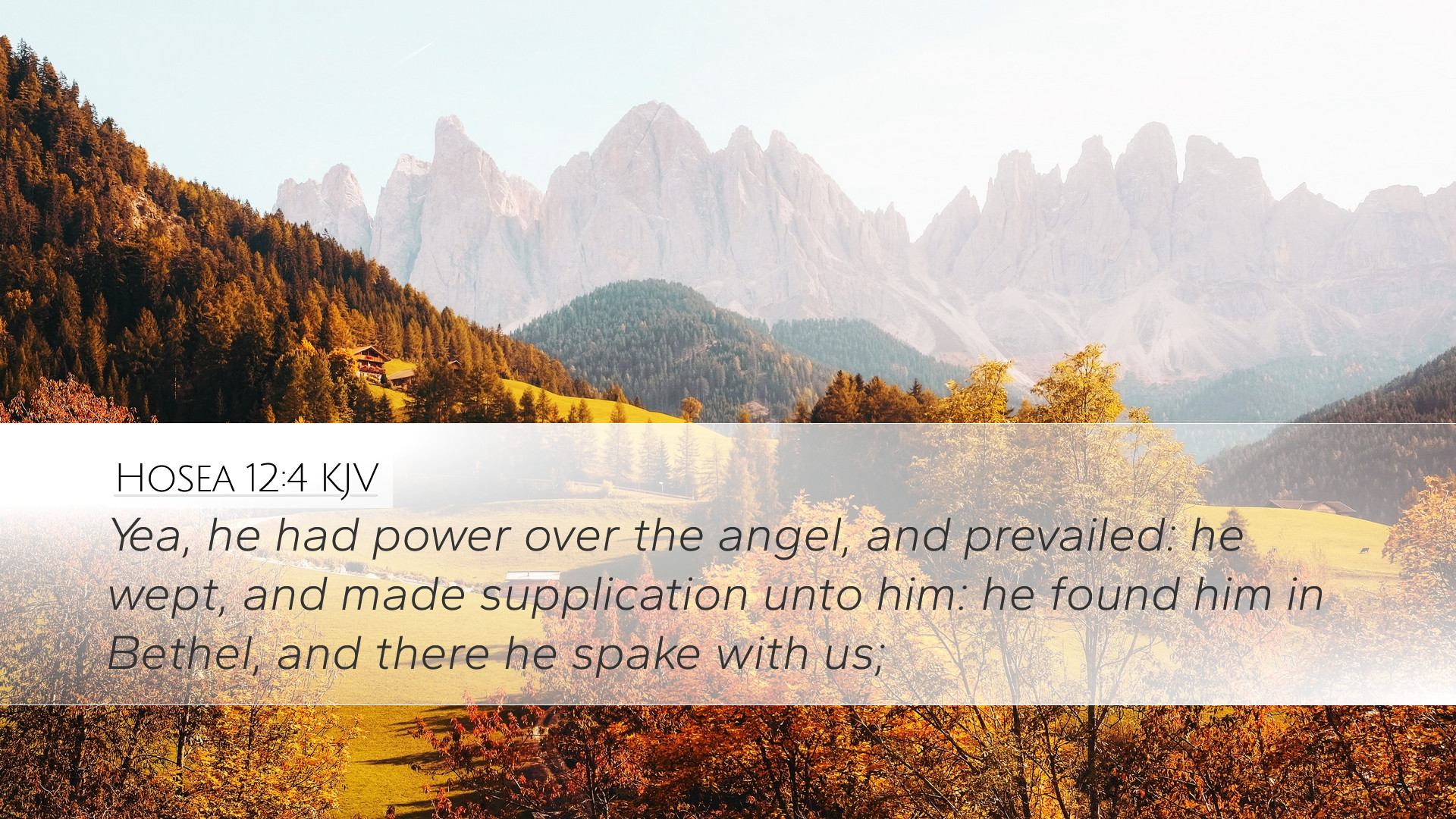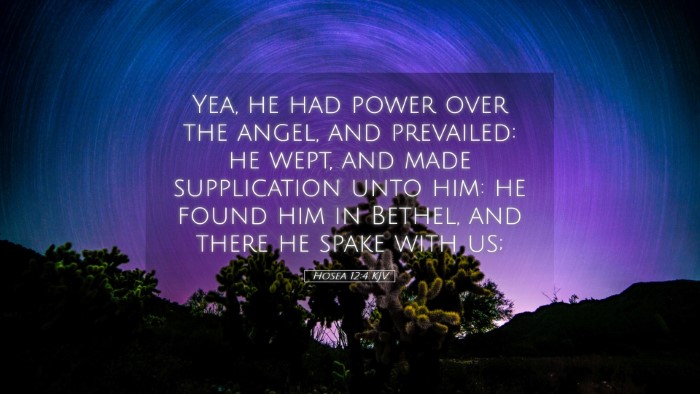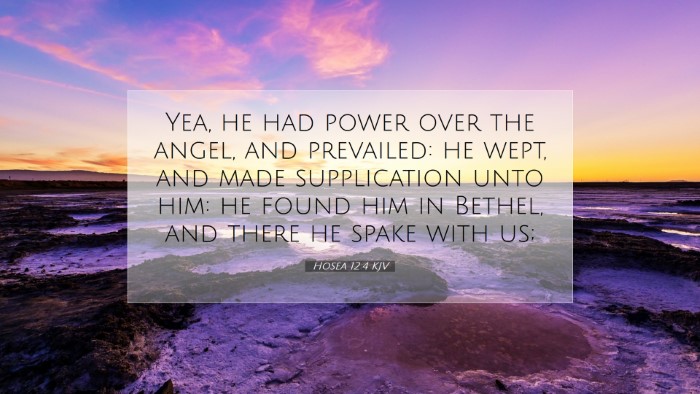Old Testament
Genesis Exodus Leviticus Numbers Deuteronomy Joshua Judges Ruth 1 Samuel 2 Samuel 1 Kings 2 Kings 1 Chronicles 2 Chronicles Ezra Nehemiah Esther Job Psalms Proverbs Ecclesiastes Song of Solomon Isaiah Jeremiah Lamentations Ezekiel Daniel Hosea Joel Amos Obadiah Jonah Micah Nahum Habakkuk Zephaniah Haggai Zechariah MalachiHosea 12:4
Hosea 12:4 KJV
Yea, he had power over the angel, and prevailed: he wept, and made supplication unto him: he found him in Bethel, and there he spake with us;
Hosea 12:4 Bible Commentary
Bible Commentary on Hosea 12:4
Verse: "Yea, he had power over the angel and prevailed: he wept, and made supplication unto him: he found him in Bethel, and there he spake with us." - Hosea 12:4
Introduction
This verse speaks profoundly about the historical context of Jacob, emphasizing the struggles he faced and the divine encounters that shaped his identity and destiny. In Hosea 12:4, the prophet Hosea draws upon the narrative of Jacob to admonish Israel, using Jacob's experiences as an archetype of spiritual wrestling and deliverance.
Contextual Analysis
The Book of Hosea addresses the spiritual infidelity of the northern kingdom of Israel. Hosea's ministry is characterized by vivid imagery and poignant warnings against idolatry and covenant unfaithfulness. In this chapter, Hosea recalls the life of Jacob, a figure synonymous with struggle, both in his human experiences and his divine encounters.
Commentary Insights
1. Matthew Henry's Interpretation:
- Henry notes that Jacob's "power over the angel" reflects not merely a physical struggle but rather a spiritual wrestling. He sees this as a foreshadowing of Israel’s ongoing conflict with the Lord.
- Henry emphasizes Jacob's "weeping" as a demonstration of earnestness in his supplication, highlighting the importance of humility in seeking God’s favor.
- His reference to Bethel serves as a reminder of God's covenantal promises, illustrating how God remains engaged with His people despite their unfaithfulness.
2. Albert Barnes' Contribution:
- Barnes points out that the term "angel" refers to a manifestation of God, as seen through Jacob’s encounter. This highlights God's multifaceted nature as both immanently present and transcendent.
- He elaborates on the emotional aspects of Jacob's struggle, indicating that it was not only physical but filled with deep spiritual implication, marking a pivotal transformation in Jacob’s life.
- Barnes also observes that the lessons of Jacob's perseverance and reliance on God are timeless, calling believers to a similar tenacity in their spiritual journeys.
3. Adam Clarke's Insights:
- Clarke elaborates on the phrase "he wept," suggesting that genuine repentance and emotional sincerity have a vital role in the believer’s relationship with God.
- He stresses the significance of “supplication” in the life of a believer, echoing the central theme of dependence on divine grace for both restoration and guidance.
- Clarke further illustrates that Bethel is a place of revelation, emphasizing that encounters with God often occur in places associated with divine visitation.
Theological Implications
This verse encapsulates several theological themes relevant for pastors and scholars:
- Divine Encounter: Jacob's struggle with the angel represents the importance of personal encounters with God, which are foundational to spiritual maturity.
- Human Frailty: The emotional language of weeping and supplication indicates that vulnerability before God is essential in seeking His mercy.
- Covenant Faithfulness: God's reaffirmation at Bethel highlights the steadfastness of the divine covenant, which remains active amid human rebellion.
Practical Applications for Ministry
Pastors and ministry leaders can draw several applications from Hosea 12:4:
- Encouragement in Struggle: Leaders should remind congregations that struggles in faith can lead to deeper revelations and transformations, just as in Jacob’s life.
- Importance of Prayer: This verse serves as a catalyst for teaching about the necessity of fervent prayer and supplication in the believer’s life.
- Celebration of Covenant Relationships: Emphasize the importance of fidelity to God's promises and the significance of community within the covenant of faith.
Conclusion
Hosea 12:4 serves as a powerful reminder of the dynamics of faith, struggle, and divine encounter. Drawing from the rich insights of public domain commentaries, we understand that this verse not only recounts the story of Jacob but also encapsulates the perpetual themes of wrestling with God, emotional supplication, and covenant relationship that resonate deeply within the Christian faith. It challenges believers to be authentic in their struggles, assuring them of God's presence and transformative power in their lives.


